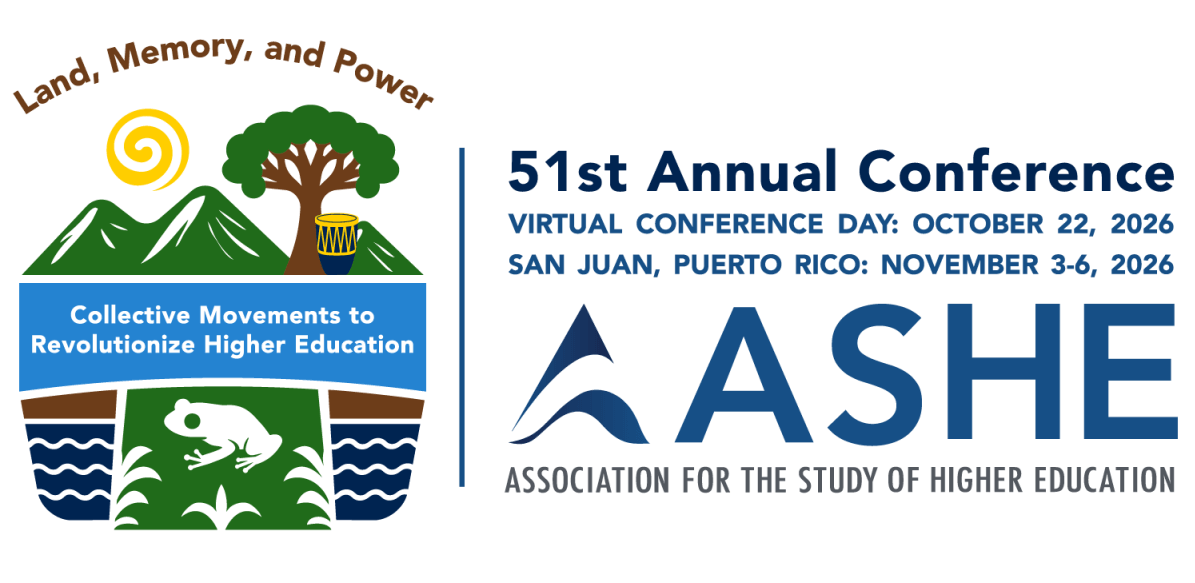2026 Annual Conference Theme
The conference theme, selected annually by the ASHE President, embodies the spirit of the annual conference gathering, serving as a lens to explore critical issues and advancements in higher education.

As read by ASHE 2026 President Dr. Robin Zape-tah-hol-ah Minthorn during the Closing Session of the 50th Annual Conference.
This year’s ASHE conference theme is “Land, Memory, and Power: Collective Movements to Revolutionize Higher Education.”
As we are engaging as an association, as universities, as scholars, and as humans, we understand that colonization has permeated the landscape and fabric of the United States, the Americas, and the world in how we anchor notions of access, success, and higher education overall. While there are efforts to erase the colonial imposition on individuals and communities targeting race, ethnicity, Tribal/Indigenous affiliation, national origin, citizenship status, class, gender, sexual orientation, disability, age, religion and the intersections across these identity markers. Indigenous Peoples, Black, Latinx, 2SLGBTQIA+, and other populations. The impacts have been felt through defunding and elimination of cultural centers, banning of DEI (Diversity, Equity, and Inclusion) initiatives, and censorship and diminishing of curriculum and voices of marginalized communities on campus. We acknowledge that within higher education, we are toiling with the efforts to undermine our advancements in creating belongingness, cultural centers, decolonizing spaces, and visibility with our students, faculty, staff, and communities.
This year’s theme acknowledges the power of collective movements to unsettle the colonial narratives that continue to shape U.S. higher education. Undoing the harm of these narratives—visible in erased histories, campus namesakes, and institutional practices—requires both naming and action. A healing praxis rooted in critical consciousness can recenter marginalized voices and perspectives, moving our scholarly community toward disruption, dismantling, and transformation. Thus, allowing us to honor memory, the land, and communities for which we are responsible and connected.
Because this year’s conference is hosted in Borikén, an archipelago, it is essential that we prepare ourselves in advance by engaging in self-reflection on how our own stories intersect with settler colonial narratives and how we are responsible for undoing harm and dismantling systems of oppression that have underpinned our higher education landscape. We acknowledge that there is ongoing colonialism in Boriken and we are not tourists but rather we are guests and allies. We must self-reflect on how this reality is visible in higher education. As an association, we have prioritized centering the local community’s narrative and connecting to place in more tangible ways. Now, we must consider how we uplift those whose stories have been silenced and lost while also recreating a story that is a shared narrative of acknowledging colonization and empowering the voices of the communities our universities are tethered to and responsible for.
To anchor us with some words of wisdom I share these quotes:
“The acknowledgment that power and place produce personality means not only that the natural world is personal but that its perceived relationships are always ethical.” -Deloria and Wildcat, 2001, p. 27)
“Somehow I learned that I belonged with my people and that I had a responsibility to contribute to them. I will participate in changing the situations of injustice and inequality that I encounter because they deny people their rights and destroy their potential.” – Dr. Antonia Pantoja, (Puerto Rican), 1922-2002, educator, feminist, civil rights leader and founder of ASPIRA, the Puerto Rican Forum, and Boricua College
Note: Connection to the theme is not a criterion for evaluation for any proposals and is not part of the review criteria. Please refer to the review criteria in the Call For Proposals for more information (2026 documentation to be released in February).
